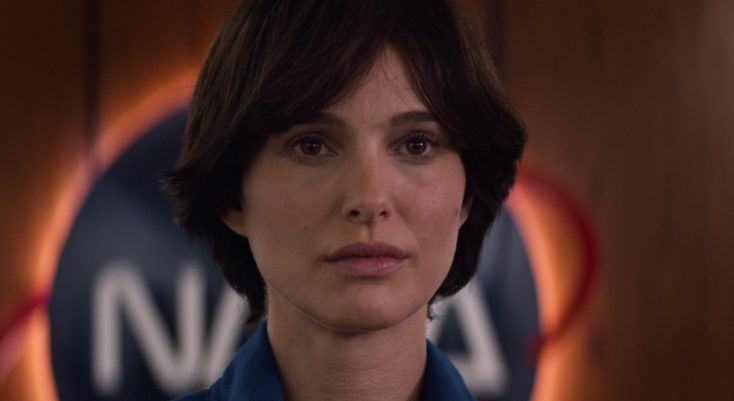
By ANGELA DAWSON
Front Row Features
HOLLYWOOD—Loosely inspired by a real-life incident in which a lovesick astronaut sought revenge against a fellow astronaut who was allegedly having an affair with another woman, “Lucy in the Sky” gives Oscar winner Natalie Portman (“Black Swan”) another opportunity to explore the fragility and reality of primal human emotions that can unexpectedly take hold over an otherwise rational, functioning person.
The 38-year-old actress, who played an alien space princess/queen in the “Star Wars” saga, delivers a very down-to-earth portrayal of a space walker who returns to Earth forever changed. Though happily married and clearly successful in her chosen career, Lucy can find nothing compares to those moments she spent during a recent space mission when she was one of only a handful of humans who have seen their home planet from afar. She watches with a mixture of exhilaration and a feeling of being a very small speck in the vast universe.
Unable to readjust to life on Earth, Lucy begins to slowly unravel. She stays out late, lying to her husband about her whereabouts and she begins an affair with another astronaut (played by “Mad Men’s” Jon Hamm). When her beloved grandmother (played by Ellen Burstyn) takes ill, her mental state further declines. The last straw comes when she suspects her lover has taken up with a rival female astronaut, who’s younger and probably more likely to get a seat on the next space expedition.
The drama is directed by Noah Hawley (writer of the “Fargo” series, making his feature film directorial debut), and co-written by Brian C. Brown and Elliott DiGuiseppi, who conceived this soapy space drama at a Mexican fast food restaurant.
Portman, who has been a leading advocate of the Times Up movement, supporting gender pay equality in Hollywood and other professions. The actress spoke about her new film, and playing a complex and flawed character, at a press conference.
Q: What was the key to understanding your character?
Portman: It was really about this existential crisis that Noah (Hawley, the director) and I talked about a lot. What happens when you have this experience that makes you feel more alive than ever and have more meaning than ever but part of that experience is really realizing how small we are and how meaningless, perhaps, everything we care about is in the universe. This relationship that she has with Jon’s (Hamm) character is very much about that, where he’s kind of positing this like, “Nothing really matters. Let’s just do whatever the hell we want,” which is so tempting to go into. She’s kind of fighting for meaning. She’s kind of fighting for, “It does matter. I do care. I am feeling something big.” Even though all sides point to (the idea of) nothing matters, (she’s thinking), “I want something to matter very badly.” It’s kind of the most human thing that we can all relate to, even if none of us can actually claim to have been in space.
Q: Because movies are rarely shot chronologically, how did you work with Noah Hawley to pitch her descent at the right level during each scene?
Portman: That was definitely tricky because it is so specific. Noah really built it in a way where the pressure just keeps mounting and mounting and mounting, like tightly wound spring, and then it just explodes. When her grandmother is sick, when she passes, when she splits with her husband, when she finds out about the cheating, when she has her problems at work, it’s like just really small little increments that just (overwhelm her). So, it was a conversation throughout.
Q: Do you think there is a difference in sensibility when men play astronauts versus when women, like Sandra Bullock (in “Gravity”), play an astronaut?
Portman: One thing I really appreciated about this was I feel like a lot of times when it’s a female astronaut (depicted onscreen), they give her a child back on Earth and it’s like that’s the only job in which the woman would possibly be thinking about her child while she’s away. So, to have a woman whose main emotional drama is having an existential crisis I thought was kind of radical and was very meaningful to me. Not to criticize—I love those movies. I’m not trying to be critical. I just thought it was a very unusual.
Q: Did you prepare for this by researching mental illness?
Portman: That’s a really great point and it’s absolutely a piece of it, but I think what’s so accurate about Noah’s guiding me through it is that it’s not one thing. It’s true for most human behavior. It’s not a simple, “Oh, there’s a childhood trauma. Let’s draw a line to this behavior as an adult.” It’s like there are many things. There’s how her family was when she grew up and the fact that she’s feeling sleep deprivation and the return from space and seeing things differently. It’s this issue at work with feeling gender-based discrimination and unfairness. It’s a man who is treating her badly. It’s her grandmother who has been her support (who is now) dying. Every person is a unique constellation of issues, to put it in space talk, but we are each unique points of specificities and our behavior is a result of all of those complicated things. It’s not one input. So yes, that’s absolutely an element (of mental illness) but there is no central element there. It’s just a collection of things.
Q: What were your most memorable moments making this film?
Portman: The bee scene. That was really one of the most magical experiences of my life. Afterwards, I was just like, ‘Thank you Noah. Thank you so much for this experience.” Because that was so cool to just be in the middle of it and holding them so close.
Also, Dan (Stevens, who plays her husband) also brought his telescope every time we had night shoots. So, between takes, we sometimes could go look at the International Space Station, which would pass right over. Those are magical moments.
Q: Would you consider this role part of the new feminist wave in Hollywood?
Portman: Every movie that is about a woman as a complex human being, with her own very specific intentions, flaws, strengths, and shows a kind of humanity, is feminist. So yes, I think there have been more different representations of women, and more complicated and agents of their own narrative. That’s part of showing women to be all different kinds of things: how they are, which is a vast, infinite array of positivity.
Q: Did you talk to astronauts prior to making this film?
Portman: Yeah, I was lucky enough to visit NASA and talk to some astronauts who had been on the International Space Station. They described how, physically, it was so hard to come back. They compared it to burning the rubber on their sneakers because it’s hard to feel your feet after being in no gravity. It was like sledging your feet. And then, of course, there is a whole protocol for their psychological well-being because it is really shocking to be there and back—for (men and women).
There’s also quite a lot of vetting that they do of potential astronauts for their social and emotional well-being because even being up there is really hard to deal with this small group of people in a confined space for extended periods of time in very stressful conditions sometimes. But you have to be pretty stable to even get the opportunity to go, which makes it even more remarkable that someone could go through such an extreme unravelling.
Q: Your character in “Lucy in the Sky” is reminiscent of the ballerina character you played who spirals down a dark path in “Black Swan.” What do you think this movie adds to the conversation about women in the workforce and the competition they face?
Portman: Unlike the ballet world, the space world is more of a situation where women are one out of 10. When you’re one of a kind, you can be other-ized or you can be “the woman.” But if there’s more than one, you have to pay attention to someone’s personality. You have to say, “Oh you know the one who is more into this specific kind of planetary (expertise),” or whatever. You have to actually pay attention to some characteristics about the person, their humanity, to describe them if you’re talking about them. You can’t just be like, “Oh, the girl.” There’s a very specific thing about being “the one” in the workplace that is a very different situation.
There’s also the other thing that is interesting about women’s work is that it tends to usually be one or like a women’s field, like ballet, nursing or teaching. That’s why the equal pay conversation is super-complicated because there are whole occupations that are exclusively women, or the majority of workers are women, and those tend to be lower-paid occupations. It’s a long conversation. I could go on.





